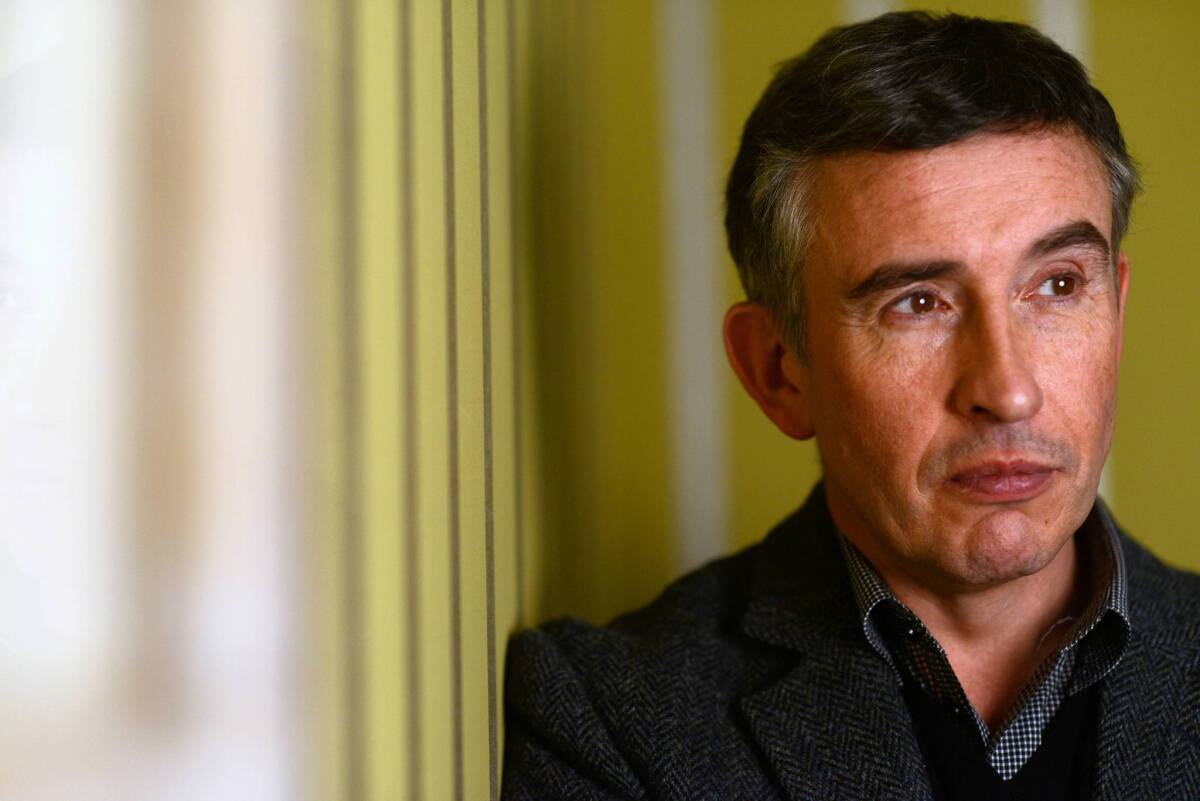The Writers: The Philomena story spoke to him

In 2009, I was sitting in my flat in New York on stand-by, playing Part No. 4 in yet another studio film. In the U.K. my career was healthy, but I was typecast and a little frustrated. An agent I’d just fired decided to dent my confidence by telling me that another hotshot agent had said of me, “I wish I’d gotten hold of Steve Coogan when he was 35.” I was nearly 44.
I decided to experiment: I would ignore all the professional advice I was getting, like, “Steve, you need to be in a frat-boy comedy,” and I would find a project and pursue it just because I wanted to. No advice, no market research, no focus groups — just something that spoke to me. I came across an article in the Guardian online titled “The Catholic Church Sold My Child.” I started to read the article out loud to my then-girlfriend, the lovely China Chow, and by the end I was sobbing. It was written by Martin Sixsmith, whose name I knew from his days as a BBC correspondent. It was a summary of a book he had written about a retired Irish nurse named Philomena Lee who wanted to trace her son, who had been forcibly adopted by Irish nuns to a U.S. couple for money in the 1950s.
The twists and turns of this story were compelling, tragic and painful. Accompanying the article was a photograph of Philomena and Martin sitting together on a bench — they were laughing. It seemed at odds with the tragic story; it tempered the sadness.
Fast forward two years (with Gaby Tana co-producing with me), I found myself in the Sussex kitchen of Dame Judi Dench, trying to condense the screenplay I’d been writing with Jeff Pope to a one-hour anecdote. After she insisted I stop calling her Dame Judi, I asked her if she was interested, to which she replied, “very, very interested.” After that, Jeff and I made sure we had scenes where there would be no dialogue — only close-ups of Judi alone with her thoughts, the pain etched on her face.
Straying from the book, we made Martin a central character in our screenplay. We had conducted numerous interviews with him and Philomena, which informed the whole narrative. It was difficult to categorize: odd couple, road movie, mystery, comedy, tragedy. We were never sure, but we knew we wanted it to be naturally funny to lift people up. We took creative liberties with the story and the characters too — mostly with Martin, whom we made more spikey and cynical than he is in reality. I was putting a lot of myself into his character. I had considered directing the film myself early on, and to not be in the movie, but my fear of directing, along with my vanity, got the better of me. So I decided, with Gaby and the BBC’s Christine Langan’s support, to give the part to myself; an early Christmas present, if you like.
TIMELINE: The Academy Awards through the years
Stephen Frears flirted with us right up to the wire and gave us good advice — mostly about clarity and brevity. He told us to watch “It Happened One Night,” and “Philomena” certainly has a flavor of that. My touchstone was “Missing,” directed by Costa Gavras. It showed that the search was just as important as the person being looked for. Pathe loved it and gave us the money to make it. We told Stephen that the ship was sailing, and he jumped on board.
I was worried about sharing the screen with England’s “national treasure,” but, on reflection, acting with her was a lot easier than it would have been with an amateur. She raised my game, and in between takes I made her laugh by doing impressions of unsavory television personalities. Stephen kept my comic inclinations in check often with just a wave of his hand, which was his way of saying, “Be a dear and take it down a peg or two, would you?” If Judi was asking a perfectly legitimate question to do with the scene, Stephen would teasingly ask if anyone had Helen Mirren’s number as if to replace her! Judi would shoot him a look.
The film deals with many themes through its two central characters: intellect, intuition, class, faith. Martin is secular (that’s my stuff), Philomena was and still is a Catholic. When the real Philomena was on set, she would tease me by telling me she was praying for the film. Stephen was worried about how to end the film, and then, on the last day of shooting, the whole landscape was laced with a perfect frost. “I have my ending!” he exclaimed.
The hand of God?
More to Read
Only good movies
Get the Indie Focus newsletter, Mark Olsen's weekly guide to the world of cinema.
You may occasionally receive promotional content from the Los Angeles Times.






